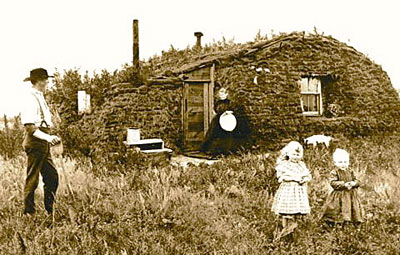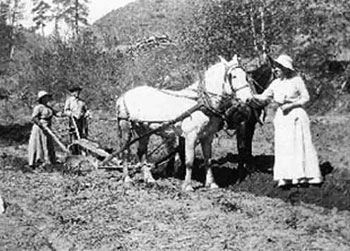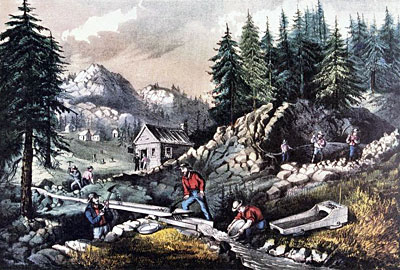Pioneer Life
The open area of the plains has little timber. Names for the open land include “prairie” and “grassland.” Lumber was scarce and expensive. Pioneers made their first houses out of sod. Sod was thick soil that contained grass roots. They stacked piles of sod, like bricks, to form houses. They burned dried cow manure for fuel. Since the railroad allowed goods to be transported across many miles and the land was vast, entrepreneurial pioneers saw opportunity if they could survive. Farmers, miners, and ranchers came to make their living in the West. Some became very rich.

Sod house on the prairie
Innovation and industry produced special equipment to plow the dense soil. The new equipment was expensive. Many farmers went into debt to afford equipment and depended upon abundant harvests. Commercial farm activity eventually took hold in the West. The businesses supplied the necessary equipment and told the farmers what to plant. These large businesses tried to control the price and supply of wheat, corn, and other crops that could be grown in the dry conditions. Local groups of small farmers began to socialize and learn from each other. They began to form clubs and became known as grangers, taken from the Grange of the Patrons of Husbandry, an organization founded by agriculturist Oliver Hudson Kelley. The word grange means "farm building" or "a place to store grain." The Grangers became more politically focused in response to corporations who tried to monopolize railroad use and warehouse space to store goods prior to movement. The Grange members operated cooperative stores and mills in an effort to gain more control of the prices of their goods.

Farmers plowing
Miners had already established themselves in California, but the prospect of gold and silver still lured diverse groups of people to mining towns, including the Chinese laborers who had worked on the Transcontinental Railroad. Mining towns, where men outnumbered women, sprang up in California, Nevada, Dakota, and Montana. Equipment for mining was necessary when surface sources of minerals dried up. Large corporations came in and began taking over the industry. Less valuable natural resources such as quartz, zinc, and copper became important mining resources.

Panning for gold